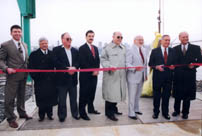Because of its unique configuration, featuring steep hills and high terrain that funnel into the streets below, North Bergen has always experienced some sewerage problems when heavy rains would occur. The problems generally stemmed from the township’s combined sewer system. “Whenever it rained hard, the hydraulic sewer system could only handle so much and it would carry over to the overflow,” said Robert Fischer, the director of the township’s Municipal Utilities Authority. “Although the excess overflow was usually 99 percent rainwater, it would also scoop up debris, like aluminum cans, Styrofoam cups, tissues and carry them through the system and they would eventually end up in the rivers and streams. Eventually, that debris would float to the shore and cause a lot of environmental problems.” However, those ecological woes are about to become a thing of the past, because the township unveiled a new Combined Sewer Overflow system, the first of its kind in New Jersey, that will filter all solids and floatable debris and stop it from reaching the rivers and streams. The new CSO was officially unveiled in a ribbon-cutting ceremony last week, but has been in complete operation since late December. All told, there are 10 chambers to the new CSO system and the last seven of the 10 were placed on-line Dec. 17. The system, which cost $3.9 million to construct, was built as a partnership with the state’s Department of Environmental Protection, using some federal environmental grants and also aid from the County of Hudson. The rest will come from the New Jersey Environmental Infrastructure Trust, which enables townships to develop environmentally-sound programs with low-interest loans. According to Fischer, the loan North Bergen received was set a 2.4 percent, which is much lower than the township would have received through conventional financing. Because North Bergen was able to secure the low-interest loan, the township will save approximately $1.5 million. “This is really a positive success story, with the solid, well-planned-out partnership that came through with the funding,” Fischer said. “It really is a unique system and a unique partnership. We’re very excited.” With the township’s new CSO system, 45 tons of solid and floatable debris every year will be captured before it deposits in the rivers and streams. “The debris used to litter the river banks and settle in the streams,” Fischer said. “It would destroy aquatic life as well as wildlife. Everything that is one-half inch or bigger in the flow gets trapped. It really is going to make life better for everyone.” North Bergen Mayor Nicholas Sacco agrees. “We’re doing whatever we can to improve our waterways,” Sacco said. “It’s the first of its kind for any urban area and it’s going to make for a cleaner Hudson River and a cleaner Hackensack River.” Sacco also applauded the MUA’s efforts. “The North Bergen MUA was once a very maligned organization and not very well understood,” Sacco said. “Since the Clean Water Act was put into effect, we’ve done everything to upgrade our plants and make everything cleaner. We’ve gone from the days when the MUA was a new concept to now where it’s a leader and an innovator. I’m proud of what they’ve been able to do and the efforts that have been made to improve the area.” Fischer reiterated that the new system was a win-win for all involved. “It’s absolutely a no-lose situation,” Fischer said. “Every way you look at it.”
Our Digital Archive from 2000 – 2016
